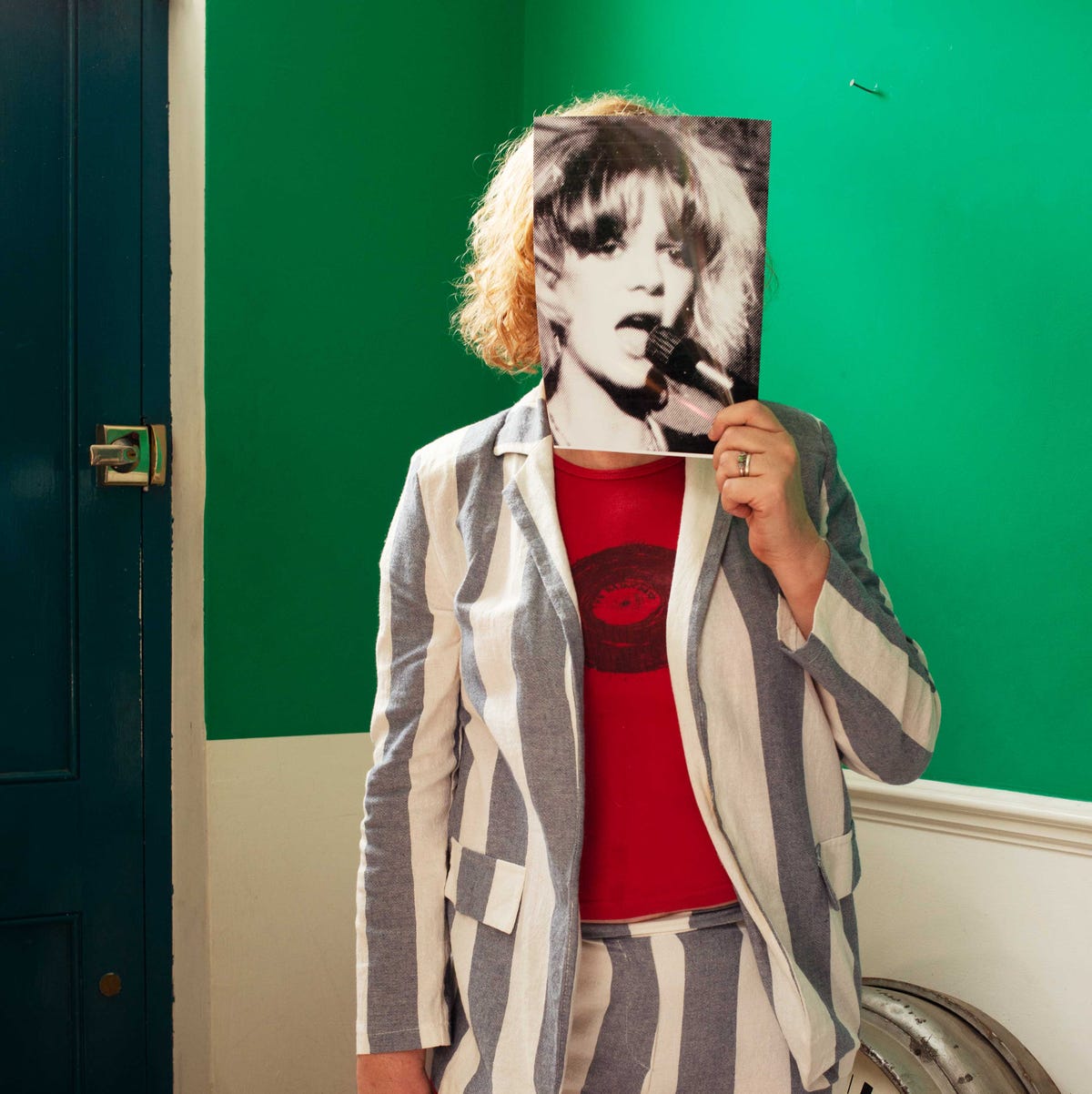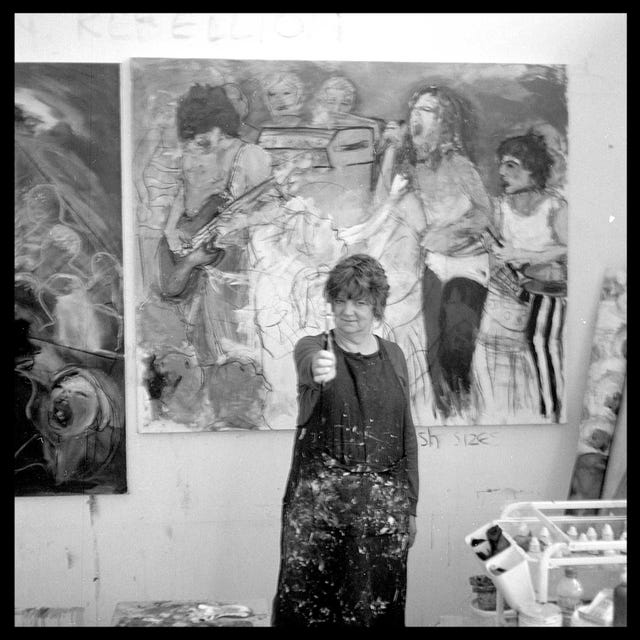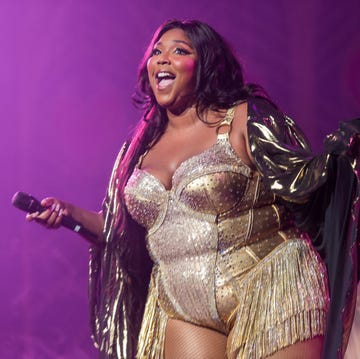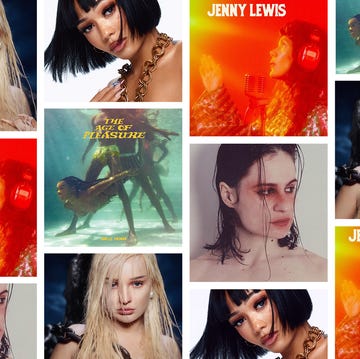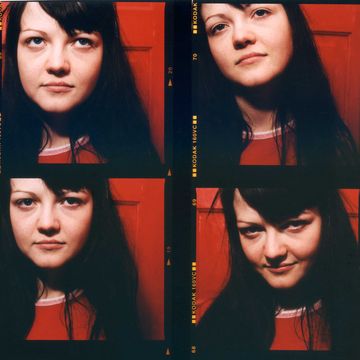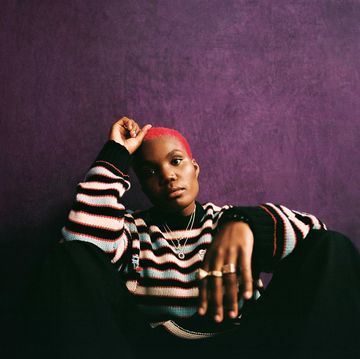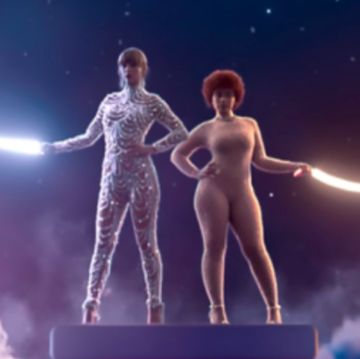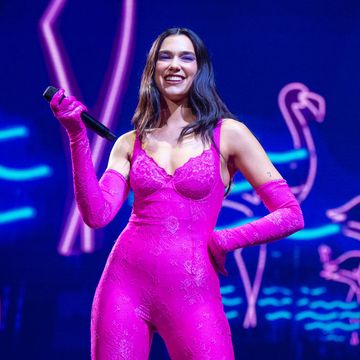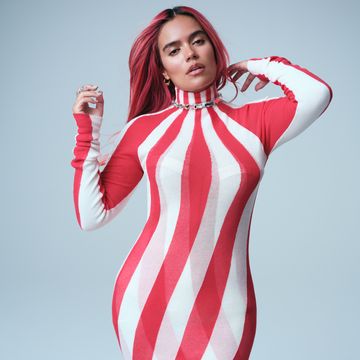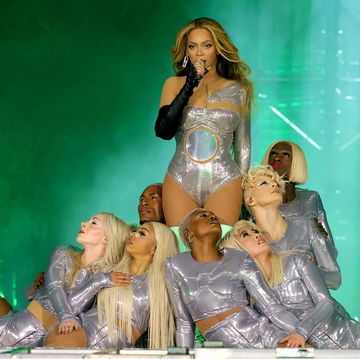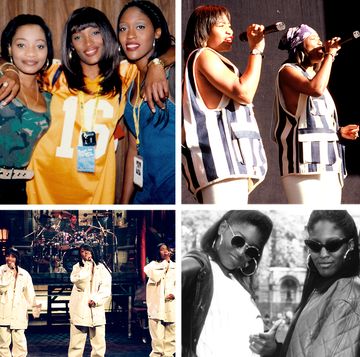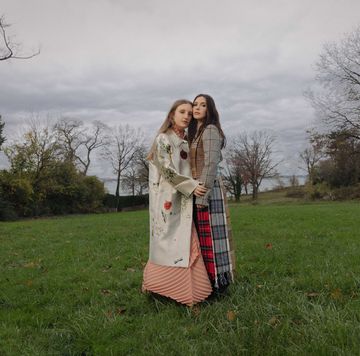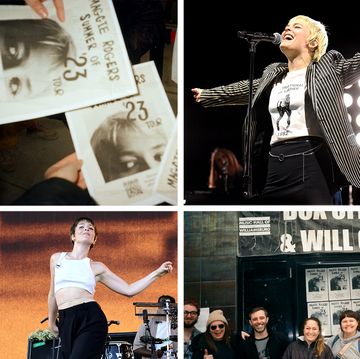As an incoming freshman at London’s Hornsey College of Art in the late 1970s, Gina Birch’s head was swimming with ideas. She’d fallen in love with performance art, land art, and film while growing up in Nottingham (of Robin Hood folklore) and was eager to experiment. “But when I arrived, the main area of buzz and excitement seemed to be around this new thing,” she told me in December, over eggs and pancakes at New York City’s Empire Diner.
Along with one of her classmates, Anna da Silva, Birch would embrace this “new thing” and form The Raincoats, a seminal post-punk band that has inspired countless musicians in its wake, from Kathleen Hanna to Sharon Van Etten (Birch recently illustrated a book of Van Etten’s lyrics). But today, she is in town to play a secret opening gig for Yo La Tengo’s annual Hanukkah residency at the Bowery Ballroom. And now, with the February 24 release of her first solo album, I Play My Bass Loud (via Third Man Records)—on the heels of a six-room solo painting exhibition, In My Fucking Room, late last year at London’s Gallery 46—Birch, 67, is experiencing only the latest of several career resurgences.
“The record is a series of thoughts and ideas I’ve jotted down over the years, some of which have mutated,” she says, while attempting to tame the wild strawberry-blonde hair that frames her face with her hands. (It doesn’t help that the temperature keeps alternating between arctic blast and humid tropics due to our diner booth’s proximity to the door, but it’s clear that Birch prefers things a bit messy—including her hairstyle. Fashion-wise, she’s a fan of “spots and stripes, short jackets, wearing things inside-out, and big shoes—like Minnie Mouse big.”)
I Play My Bass Loud’s title track opens the record, and is a fun, dub-heavy statement of purpose. “Wish I Was You” has a Breeders “Cannonball”-esque drum-and-feedback squall with guitar courtesy of Thurston Moore. Elsewhere in the effort (produced by Youth of Killing Joke) are echoes of ’60s girl groups and 2010s protest punk à la Pussy Riot.
The album’s cover, a relatively recent self-portrait featured in last year’s exhibition, depicts a young Birch screaming into a bathroom mirror opposite a kitchen sink full of dishes. It’s a scene from her time at art school, when she lived in a West London squat and “fell into a little enclave of what would be punk, I suppose,” she says. It was there that she met da Silva, a fellow student from Madeira, Portugal, and “two boys who were friends with The Clash’s roadie. We started going to lots and lots of gigs—the Sex Pistols, The Clash, Subway Sect, the Buzzcocks—just so many bands, and they were just fantastic. It was electric.”
Occasionally she’d see a band that had a female member: “You had Gaye Advert [aka Gaye Black, bassist for the Adverts] or [X-Ray Spex frontwoman] Poly Styrene, who was stunning,” she says. “But when I saw The Slits—this all-female band—it was like the lights went on. It’s hard to describe it, but it was just completely different. It was like they were saying to me, ‘You can do it, too.’ And I wanted to do it—right there and then. Ten minutes before, I hadn’t wanted to be in a band.”
Birch mustered up the courage to walk into a guitar shop and buy a bass. “I didn’t have the confidence to think I could be a guitar player or a singer, and it never occurred to me that I could possibly play the drums. That seemed really complicated. I thought the bass would just about fit me—with just four strings, I thought it would be easier,” she says. “At the store, they thought I was a bit odd for buying a bass that I hadn’t even tried out. But I didn’t want to because I didn’t know how to play it!”
She brought the instrument home and taught herself to play along with the basslines in a Toots and the Maytals record. When da Silva returned to school after a break in Madeira, she heard Birch had bought a bass and asked her if she wanted to jam. “Within about three or four weeks, we’d been invited to do a gig,” Birch says. “It was terrifying, but we were art students, so in a way, it was kind of an art exercise as much as anything.”
By the time Rough Trade Records released The Raincoats’ first single, “Fairytale in the Supermarket” in 1979, the band was a foursome with Birch on bass, da Silva on guitar and vocals, Vicky Aspinall on violin, and Palmolive (formerly of The Slits) on drums. The jagged, chaotic, exuberant noise that erupted from their recordings and live performances cemented the band’s place in post-punk legend. Palmolive would leave the band after their first full-length record, but The Raincoats would continue as a trio for two more albums before separating to pursue other projects. Birch joined Red Crayola for a period, formed Dorothy with Aspinall, and then the Hangovers with former members of Voodoo Queens, Stereolab, and Laika. Eventually, she went back to school and studied film direction at the Royal College of Art.
In the early ’90s, as grunge and riot grrl were taking off, The Raincoats enjoyed their first revival. “When Bikini Kill and all those bands suddenly held up a mirror back to us and said, you were really important, that was really shocking—and brilliant and inspiring and heartwarming,” Birch says. We weren’t massive. We didn’t play that many gigs. And then suddenly we find out that there was this whole movement, and all these young women were really inspired by what we and The Slits and other bands had been doing. That was incredible.”
The Raincoats discography was reissued in 1993, with liner notes by famous fans like Kurt Cobain and Kim Gordon. “It was the Raincoats I related to most,” wrote Gordon. “They seemed like ordinary people playing extraordinary music. Music that was natural that made room for cohesion of personalities. They had enough confidence to be vulnerable and to be themselves without having to take on the mantle of male rock/punk rock aggression—or the typical female as sex symbol avec irony or sensationalism.”
In celebration of the reissues, Birch and da Silva reformed the band to play a few gigs, including the U.K. stretch of Nirvana’s 1994 tour, though Cobain died shortly before it was scheduled to begin.
A little over two decades later, Birch would find herself on a stage once again, this time presenting a documentary she made with Helen Reddington (a.k.a. The Chefs’ Helen McCookerybook) called Stories From the She-Punks. “We interviewed lots of women who’d started bands in the punk era,” she says. While only a few had achieved success by traditional standards, she noticed that “everyone we talked to had a kind of vibrancy about them,” as if participating in the scene “had elevated them out of a kind of gloomy domesticity—they’d found that they could be creative together and perform and have fun. Enid Williams from Girlschool’s quote was, ‘We didn’t want to stay in Tooting for our whole lives and be secretaries.’ That happened to a lot of women of our mother’s generation.”
During the preceding two decades, on top of her work with Red Crayola, Dorothy, and The Hangovers, Birch filmed music videos for bands like The Libertines and Palma Violets and recorded a fourth Raincoats album, Looking in the Shadows, with da Silva.
She’d also started a family with her husband, Mike Holdsworth. After seven miscarriages, the couple adopted two girls from China: Honey in 2000 and Lei-Lei in 2003. “By the time I got my daughters, I was so ready to be a mum,” she says. “We made lots of films and did lots of singing and dancing and gymnastics. I was doing mosaics and knitting—a much more domestic kind of creativity. When I first got Honey, she was eight and a half months, and I was like, ‘What do I do with this baby?’ So I would just sing with her.” Despite being one of the coolest moms a daughter could hope for, Birch admits that she, like all parents, was an endless source of embarrassment during her girls’ adolescence. “I’d be like, ‘We’ll win this dance competition!’ And then it was like, ‘Mom, don’t!’”
While speaking on the panel at the She-Punks screening, Birch was asked whether her daughters knew about her music and what they thought of it. “I said, well, you know, the thing is that I’m not really sure that they like what I do all that much. I know some of their friends do, but I’m not sure what they think,’” she recalls. “Then suddenly, out of the blue, a voice piped up at the back of the auditorium saying, ‘Of course I like what you do. It’s just because you are my mum!’” Birch laughs. “My daughter Honey had slipped in toward the end, unbeknownst to me, and then bravely told everyone that she liked what I did.”
When it came time to shoot a video for I Play My Bass Loud’s first single, “Wish I Was You,” Birch tapped Honey to direct. It’s a fitting, ’90s-inspired visual, complete with tongue-in-cheek angst (think: “Shiny Happy People” meets CK One commercial). Lyrically, it’s about realizing that someone you once looked up to now looks up to you. And initially, she worried that the concept was a bit narcissistic, until she realized it was sort of emblematic of her life at this moment—“where I was being picked up and swept along, and my life was moving in a way that was unexpectedly great.”
Which brings us to her career’s most recent renaissance, which she calls “maybe the most shocking.” She and da Silva had been put in touch with Third Man Records, which was looking to release some U.K.-related material in celebration of the opening of its London location in 2021. The Raincoats had nothing that wasn’t already spoken for, and Birch had turned her focus to painting, “but, you know, I’ve always been dabbling, expecting someone at some point would ask me to play a show,” Birch says. “So I told them, ‘Yeah, I’ve got a few songs.’” She recorded “Feminist Song” for the label. “And then they asked if I’d be interested in doing an album,” she says.
When asked if there’s anything she hasn’t done yet but would like to, Birch’s eyes light up. “Well, I always wanted to make a musical—like a remake of Godard’s A Woman Is a Woman as a musical. I also would’ve liked to have learned how to skateboard, but I’m too late for that. I tried rollerblading, and I couldn’t even stand up!”
For now, her immediate plans are to check out King Pleasure, the sprawling Basquiat exhibition on view a few blocks away, and then: “make more records and play more gigs.” She smiles and shakes her head, still a bit surprised by her life’s latest turn but happy to ride the wave regardless. “It’s just completely unexpected...and totally appreciated.”
Melissa Giannini is the features director of ELLE.
